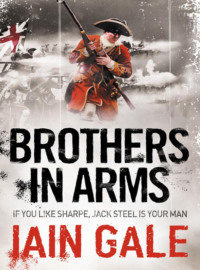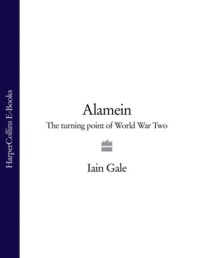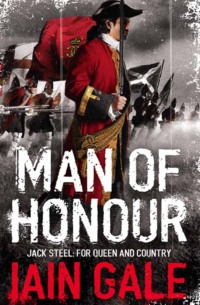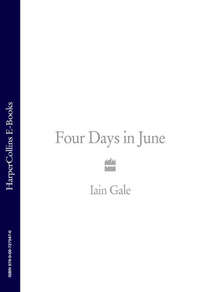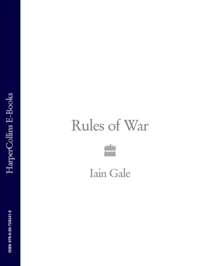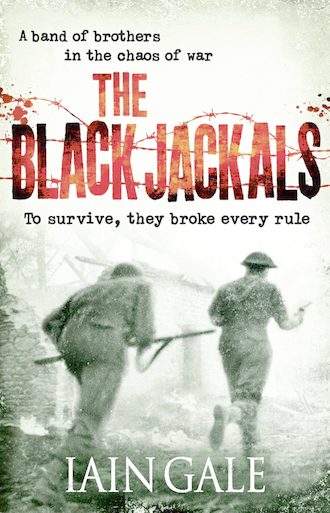
Полная версия
The Black Jackals
Lamb spoke. ‘Well done, Corporal. That’ll slow up the Boche.’
The man looked at him and Lamb noticed, not for the first time, the irritating smirk that seemed to lie permanently around his thin lips and his curiously educated accent. ‘Please don’t thank me, sir. Not for doing that.’
‘I had no choice, man. You saw. The enemy . . .’
‘I saw, sir. And I promise that I shan’t tell anyone what it was that you just did. Why should I want to do that, sir? They might get the wrong end of the stick.’
Lamb stared at him and was just about to challenge his remark when a voice from his rear shattered the opportunity.
‘Sir, look. Over there. In the trees.’
Lamb raised his field glasses and looked through them across the river towards a spinney of poplars by the edge of the road. At first he thought the shapes he could see were more refugees, but then he saw the flash of steel and knew at once that they were the enemy.
‘All right, here they come. No one fire until I give the command. Parry, set up the mortar over there. Zero in on the centre of the bridge. They might try and use the wreckage to get across.’
He had hardly spoken when there was a burst of machine-gun fire from the opposite bank. ‘Take cover.’
Lamb pulled his revolver from the canvas holster on the left side of his webbing belt and yelled, ‘Sarnt Bennett, Corporal Briggs. Get that Bren working. Thompson, you and Massey get on the anti-tank rifle. Save it till you see any tanks. The rest of you save your ammunition until you see a good target, then let them have it.’
He felt anger now. Anger at what he had just been compelled to do, an act that sickened him and went so much against everything that he believed in. Killing helpless civilians. And here now was the chance to assuage that anger, against the men who had caused it. He heard the Bren rattle into action and saw the flash from the muzzles of the German rifles as the enemy responded. There were shouts from across the river.
Lamb yelled at the section closest to him, ‘Perkins, Dawlish, all of you, keep your heads down and your guns trained on the road. See the first flash of field grey that comes into range and you open fire. Smart, get on the blower back to Company HQ. Tell them we have contact. Enemy tanks, estimate zero six, infantry four zero plus.’
As his batman spoke into the handset of the .38 radio, the enemy machine gun crackled again and turned over a few sods of earth on the lower part of the riverbank. Smart turned to him. ‘Can’t raise them, sir. Line’s dead. Not a thing.’
‘Keep trying.’
Lamb opened the chamber of his revolver, checked that it was full and snapped it shut again. His fellow officers agreed: the Enfield pistol was a sad excuse for a sidearm. They said the enemy had automatics that never jammed and fired like a dream. He couldn’t wait to get his hands on one. But that of course would mean either taking one off a dead German or winning one himself in hand-to-hand fighting. Perhaps, he thought, in the next few minutes he would have a chance to do both. But his keenness quickly turned to disappointment.
Bennett was at his side. ‘Pull back, sir. CO’s orders. We’re to pull out.’
Lamb shook his head. ‘What?’
‘We’re pulling out, sir. From the CO.’
Lamb shook his head again and laughed. ‘No, Sarnt Bennett. This is no time for one of your pranks. There’s hundreds of Jerries over there and it’s our business to deal with them and see they don’t get across this damned river.’
‘Sorry, sir. It came direct from Battalion, it did. Our orders are to withdraw. Clear as day, sir.’
Lamb frowned. This was no joke. ‘You must have got it wrong. We can’t be pulling out, Bennett. We’ve just blown the bloody bridge and we’ve got the enemy pinned down. And what about those poor bloody civilians down there dead in the river? I’m telling you, man, the Jerries won’t get across here for hours, and then we’ll be waiting for them. You can see that. What we need is reinforcements.’ He turned to his batman. The poor man was still trying to contact company HQ. ‘Anything?’
Smart shook his head.
‘Right. Is that runner still here, Sarnt?
‘Sir.’
‘Then get him to take this message back to Company HQ: “Need reinforcements soonest. Your order not understood. Please send help. Enemy now in range preparing to engage.”’
The sergeant pursed his lips and nodded. ‘I’m sorry, Mister Lamb, sir. That runner is straight from the CO. It was quite clear, sir. Pull everyone out, he said. Everyone, sir. And that means us. I’m sorry.’
Lamb stared at him. This was madness. First they tell him to stand his ground and to blow a bridge, killing dozens of innocent people, and then they tell him to abandon the position.
Lamb shook his head. ‘I’m sorry too, Sarnt.’ He paused. ‘I’m sorry because I just can’t do that. Not until we’ve killed a few more of them, at least. Then perhaps we’ll come along. Eh? Why don’t you tell the Major that we’re . . . I know. Just tell a runner to tell him we’re caught up in a firefight and trying to disengage. Tell him that we’ll be with him presently. Just as soon as we can retire without the risk of taking any further casualties.’ He was damned if he was going to pull back now.
The sergeant looked at him and smiled. He had somehow sensed that Lamb wasn’t going to take an order like that without some sort of protest. ‘Very good, sir. If that’s your orders, that’s your orders.’
‘That is an order, Sarnt Bennett. Send one of the men back to the CO. Thank you.’
The sergeant turned and was about to go when he looked back. ‘There was one other thing, sir. Runner said that he’d heard on the wireless at Battalion HQ that Mr Chamberlain’s been given the heave-ho. Winston Churchill’s the new PM. Fat lot of good that’ll do us though, sir, eh?’
‘Thank you, Sarnt.’
Lamb smiled and, as his sergeant turned and trotted off at a running crouch to send word to Battalion HQ that they would not be obeying the new orders, he turned back to his front. It was strangely quiet again now, save for the occasional groan from one of the wounded. So Chamberlain, the great appeaser, had finally gone and Churchill was in. He wondered what his father would have made of that. He had never had a good word to say for Churchill after the Dardanelles. Lamb frowned. The man was damned old, too. Didn’t the country need new blood now? A young man at the helm? The news did nothing to raise his downcast spirits. He peered across the river and began to make out small grey-clad figures darting through the trees. They were moving up in some strength. Within minutes he knew they would be dug in. Focusing his field glasses, he froze as he noticed that at the edge of the road across the bridge, where the charge had blown a hole, a party of men were climbing down into a section that remained above the river bed, passing down planking and metal sheets. A bridging party.
Without thinking he shouted to Valentine, who was in the neighbouring trench, ‘Corporal, how many grenades do you have in that hole?’
‘Dunno, sir. I’ve still got mine, and White has the same. Then there’s Perkins and Butterworth.’
‘Right. Get them all over here to me and yell across to Mays to do the same with his lot. Double quick. And bring a sandbag.’
‘A sandbag, sir?’
‘You heard me. A sandbag. Empty.’
He was staring intently now as the Germans began to dig themselves into holes around the places where the debris of the bridge had already raked the earth into shallow holes.
Mays came running up to the trench, clutching four hand grenades against his tunic. ‘Here you are, sir. Corporal Valentine’s on his way.’
‘Thank you, Mays. Get back and keep up a steady sniping fire against those men. Tell Sarnt Bennett to get the Bren firing at them too. Long range, I know. Just try to stop them digging in.’
Mays went off and Lamb watched him go. He admired his lanky stride and remembered a cricket match back at the depot at Tonbridge, officers versus men, when Mays’s spin bowling had caught them all on the wrong foot. He was a mild-mannered man, a farmer’s boy who wrote letters home at any lull in the fighting, and, though he would never admit to it, had been going out with the same childhood sweetheart since he was 16. Lamb hoped that he would make it through to see her again when this lot was over.
As he was thinking, Valentine slipped into the slit trench next to Smart and Lamb. ‘Grenades, sir. As many as we could find.’
‘How many?’
‘I’ve got four, sir. And a sandbag.’ He lingered over the word as if to emphasise its apparent absurdity, and held out the limp piece of canvas sacking.
‘Right, with Smart’s that makes nine. Thank you, Corporal. Pile them on the floor. There.’
Valentine placed the grenades gingerly in a roughly geometric pile with those that Mays had left and stood back to admire his handiwork.
Lamb, who had been staring at the Germans through his field glasses, now saw him. ‘Right. Now get back and help Mays to keep those Jerries’ heads down.’
He opened the sack and gave it to Smart. ‘Right. You hold it, I’ll fill.’
Taking the grenades from the pile on the floor of the trench one by one, he placed each of them carefully inside the sandbag, conscious all the while that time was running out. ‘Right, Smart. Well, man, aren’t you going to wish me luck?’
Smart stared at him but before his batman could say anything Lamb was up and over the top of the trench and running hell for leather down the grassy embankment towards the German lines, the heavy bag of grenades clutched tightly to his chest.
He slipped and slithered down the muddy slope, praying with every step that he wouldn’t fall and hearing his heart pounding in his chest, all the while keeping his eye on the Germans ahead of him. Over to his right he was aware of a flash and then the deep rattle of a machine gun. The earth around his running feet began to fly in all directions as bullets tore into the grass and mud. From his rear he heard the familiar answering cough of the Bren, and the enemy machine gun stopped. But then as soon as their own had paused to reload and change barrels, the Germans opened up again.
As he ran further to the left, away from the gun, he was aware that it must now be traversing, following him, but always just a fraction behind. He had reached the river now and almost stopped as he felt a bullet whistle past his face. Rifle fire now, from the opposite parapet. The Bren was in action again and he could hear the intermittent crack of the bolt-action Enfield rifles. Bennett, Mays and Valentine were doing well. Lamb kept on running, jumped the headless bodies of two civilians and saw dead ahead of him the helmeted heads and field-grey torsos of the Germans digging into the earth to the right of the bridge, preparing a fire pit for mortars and machine guns. That was his first objective, and then he’d find the bridging unit. Suddenly nothing else mattered but to reach them and to do what he had set out to do. Any other thoughts of home were now gone from his mind. Nothing there now but the urge to do whatever it took to make sure that the men digging those holes and spanning that chasm would never finish their job.
He was within thirty-five yards of them now, and still the air around him seemed to be thick with bullets, as if he were standing in a swarm of bees. He did not think that he had been hit, but then in the past few minutes he had really ceased to care and had begun to feel almost invulnerable. A sudden sense of euphoria swept over him. In the lee of the upper span of the ruined bridge he stopped and used the remains of a civilian cart and its dead horse for cover. German bullets thwacked into the horse’s cadaver, sending sprays of blood in all directions. Lamb kept his head down and, taking two grenades from the bag, primed both. Then, holding one in each hand he released the levers, counted to four, half raised himself for a moment and, judging his target, threw them quickly, one after the other, conscious that his left arm would not be as strong or as able as his right. Ducking down, he watched them arc and saw them land. Then he covered his head. The blast rocked the bridge for an instant and was followed by screams.
Lamb took two more bombs from the bag and pulled their pins, careful to hold the levers down. He lifted his thumbs, counted and then rose again and threw them in swift succession. Two more explosions and a rattle of machine-gun fire told him that they had done their job. There was shouting in the German lines now, along with the screaming of the wounded. One of the bombs had burst off target, against the side of the bridge, sending a welcome column of brick dust into the air and obscuring Lamb from the enemy gunners. But as he prepared the next two grenades there was a burst of automatic fire and bullets smacked into the horse; one of them, bursting through its withers, touched him on the arm and tore open his tunic. He looked down and saw blood but was aware that it had merely grazed him. He stood now, hoping to get a better aim, ignoring the fact that he was more visible, and after releasing the levers and counting, hurled the two bombs towards the Germans. From behind him a welcome salvo told him that his men were still giving covering fire. Three grenades left. He was unsure what effect he had had thus far, but judging from the commotion he had connected with something. His heart was beating faster now, the sweat pouring off him. Half blinded by the dust, he primed two more grenades. The blood from his arm had trickled down his sleeve and was slimy in his fingers, almost making him drop one of the Mills bombs. Through the smoke he saw the figure of a tall German officer signalling to two men carrying a machine gun and pointing directly to him. Not hesitating, Lamb took his thumb off the lever of one grenade, let the seconds tick by and then threw it at the group. He did the same with the other bomb before turning and slinging it towards the half-dug-in gunners. He knew that he had hit them and that the immediate threat had gone, but they would lose no time now in pouring all their fire on to him and there was only one way back.
He pulled the last grenade from the bag and drew the pin, still holding the lever down. Then, turning, he began to run. After five paces he turned and found himself looking at the levelled rifles of a score of the enemy. Praying that they would miss, he counted to four, threw the grenade as the rounds began to whistle in and, not waiting to see the result, spun round and ran. Uphill now. Harder, but he knew that the explosion would cover him for a moment. Again the grass flew high as the bullets struck home. He felt a sharp pain in his heel and presumed he had been hit, but kept running. Now was not the time to stop and look at any damage. He was aware too of a growing ache in his arm where the bullet had grazed it and hoped that that was all that it was. He was nearing the trenches now and the German rifle fire had lessened, although the machine gun on his left was still firing. Where the devil was the Bren? Reaching the last few yards before his trench, he could hear the men cheering him on and then he was home, slithering down the side and thumping on the muddy floor. He could hear his breathing, almost as if it were another man’s, and a steady thumping which he realised was his heart.
Fred Smart just stared at him. ‘Bloody hell, sir. That was fuckin’ incredible – if you’ll pardon my French, sir. Sorry, sir.’
Lamb grinned, happy and surprised to be alive and, wiping the sweat from his eyes with his bloody right hand, gasped for breath. ‘Thank you, Smart. How did I do?’
‘Pretty well, sir, I’ll say. You blew that lot in the bridge to blazes and that machine gun that was setting up with them an’ all.’
‘Did I stop them digging?’
‘You stopped them, sir. They won’t be doing any more digging where they’ve gone.’
He looked out over the top of the trench and surveyed his handiwork. In the centre of the bridge lay the bridging party, six of them, all dead. Beyond, where the Germans had been entrenching positions, were more dead, and he could see wounded being carried back by enemy medics. Across to the right a crew lay about its mangled machine gun. He had killed perhaps twenty men, all told. More importantly, though, he had stopped the enemy digging in positions and crossing the river. For the present.
Smart looked at him. ‘Hadn’t you better get that wound dressed, Mister Lamb? Get Thompson to have a look at it, sir.’
Private Thompson, aside from being in charge of the anti-tank rifle, was also the platoon medic, and while every man carried a field dressing he had charge of the medical supplies.
‘No, Smart. It’s nothing. Just a graze.’ However, he wasn’t so sure. He felt the twinge in his foot and looked down to see that the back of his boot had been shot off. Fearing the worst, he quickly bent to see what damage had been done and was relieved to see that although covered in blood his heel had only been nicked. Looking back at his arm, though, he could see that what he had thought a mere graze might well be something worse.
He unbuttoned the cuff of his tunic and rolled up the sleeve, then did the same for his shirt. In his forearm just below the elbow was a neat gash where the bullet had torn through the cloth and into the flesh and muscle. It had not gone deep, but enough to cause him discomfort and to restrict his use of the muscles.
‘Damn.’
Smart held back the tunic and began to swab at the wound with some gauze. ‘Looks clean enough, sir. I’ll get Thompson, though, and we’ll get you fixed up back at Company.’
Lamb shook his head. ‘I have no plans to move to the rear just yet, Smart. We’ve got unfinished business here.’
Smart stopped swabbing and listened: ‘They’ve ceased firing, sir.’
Lamb listened. It was true. Since he had regained the position the Germans had ceased fire. He wondered why. He saw Bennett running across to him, careful to crouch down as he did so.
Valentine came close behind him. ‘My God, sir. That was the most heroic thing I think I’ve ever seen. Well done, sir.’
Lamb smiled. ‘Well done you, Bennett, with that covering fire. And you, Valentine. All of you. Where’s Corporal Mays?’
‘Bren’s jammed, sir. He’s trying to fix it now. Perhaps you should ’ave a look, sir.’
The men were well aware that in civilian life Lamb had been in charge of a motor garage and respected his expertise with engines, which on more than one occasion had proved useful in camp.
‘Yes, perhaps I should.’
He started as Smart’s final swabbing touched a particularly sensitive area of the wound in his arm. Bennett saw it. ‘You’re hit, sir. Not bad, is it?’
‘No, Sarnt. Not that bad. I’ll live.’
Valentine, who was squatting at the edge of the trench, looking with interest at Smart’s handiwork, spoke. ‘Have you noticed they’ve stopped firing, sir?’
‘Yes, and we were wondering why.’
Valentine smiled. ‘Perhaps they’re just frightened in case we’re all as mad as our Lieutenant.’
Bennett glared at him but said nothing.
Smart, winding a bandage around Lamb’s arm, piped up, ‘That’s it. I reckon you’ve terrified them good and proper, sir. They didn’t know what they were up against. Perhaps they’re packing up now to go back to Germany like good little Huns, sir.’
They laughed. But Lamb did not smile. He was looking back down towards the bridge. ‘No. I think they’re just waiting.’
So they waited. For two hours they sat in the afternoon sunshine, drinking strong, sweet tea thick with powdered milk. Lamb listened to them chatting. The conversations ranged over football, their girls and some film with George Formby that had them laughing in the aisles, and it seemed almost as if for them the war had ended here. Some of them, he rightly guessed, would be praying that by some miracle it had. One of them, Butterworth, the platoon wit, even suggested that Mr Churchill had been on the telephone to Herr Hitler and told him that he might as well go home to Berlin because their Mister Lamb wasn’t going to give up his bridge.
Lamb laughed with them at that.
They had grown closer during the course of the last few months and he had come to know their individual characters and idiosyncrasies.
Aside from Bennett and Mays, there was Smart, his batman: ever-loyal Fred Smart, still living at home with his parents in their little cottage in Godstone; Butterworth, a giant of a man with hands that looked clumsy but were able to strip down a Bren gun faster than any other man in the platoon; Tapley, the runner, short and slight, with a weasel’s face and deep brown eyes, Tapley the lady’s man who could charm a pint of milk or a bottle of wine from any French girl. Perkins was the dedicated soldier of the group, gritty and uncompromising and more convinced than any of them of the urgency of crushing Hitler. Hughes was the great thinker, always mulling over some problem or other that the rest of them might have missed. His solutions tended to be right, and Lamb had him marked down as a possible future corporal. Short and stocky, George Stubbs the mortar man was always singing or humming to himself – the old favourites, mostly, songs that helped to calm his shaky nerves: ‘Pack up Your Troubles’, ‘It’s a Long Way to Tipperary’, ‘The Siegfried Line’. But lately he had begun to favour some of the more recent popular songs, George Formby in particular. ‘Imagine Me on the Maginot Line’. That always got them all laughing. Wilknson mostly, always keen for a joke. Most of them practical.
And then there was Valentine. Lamb smiled and shook his head. He closed his eyes, and was even beginning to think that he might take some rest, when he heard it – a low rumble which quickly grew in intensity until the ground seemed to shake. Christ. They were bringing up their tanks.
Instantly he shouted down along the line and back towards the woods, ‘Sarnt Bennett. Enemy tanks to our front. Bring up the anti-tank rifle.’
He thought they would try a crossing now, while they had surprise on their side and they think we’re shaken. But if we can stand our ground we might just hold off the first wave. We can’t really destroy tanks. No hope of that with what we’ve got to hand. But if we can take out as many of the infantry as we can before we pull back, then at least we’ll have done something to atone for the deaths of those poor blighters in the river.
He yelled towards the rear and saw the Boys anti-tank rifle gunner and his mate sitting in a nearby slit trench lining up the slim-barrelled weapon on a make-believe target on the opposite bank. ‘Thompson, hold your fire with the Boys until you can get a clear shot. 500 yards. No more.’
There was an answering ‘Sir’. Lamb cast a pitying look at Thompson. The recoil from the anti-tank rifle was well known. He took out his binoculars from their canvas case on the right of his belt and scanned the road again and the trees on either side. Then he saw them. There were two in the lead. Panzer Mark IVs, by the look of them, with small triangular pennons flying and the squat angular turret and short-barrelled cannon that he recognised from the silhouettes on the recognition charts at the officer training school. His stomach felt suddenly hollow, and he could feel himself sweating. More tanks were following on behind. A whole squadron, perhaps more. And he knew that save for the single anti-tank weapon, the less than reliable Boys anti-tank rifle, they were powerless against such armour. Certainly, when it had first been introduced four years ago, it had been able to penetrate the armour of any tank, but tanks had come a long way in four years, and Lamb knew that against the machines facing them, the best the Reich could muster, it would be almost useless. Even their grenades, the egg-shaped Mills bombs developed in the last war, would merely bounce off the hulls. All they would be able to do would be to rake the ground around the advancing vehicles with small-arms fire as the infantry crept forward in the lee of the tanks and try to keep their heads down as the shells crashed in.
He yelled again, ‘Wait for it, lads. It’s the infantry we’re after. Wait for the . . .’ He had not finished his sentence when there was a whoosh from the opposite bank and a shell flew towards them, hitting the bank just to their front, its explosion sending up a cloud of earth and foliage. ‘Keep down. Keep your eyes on the road.’




